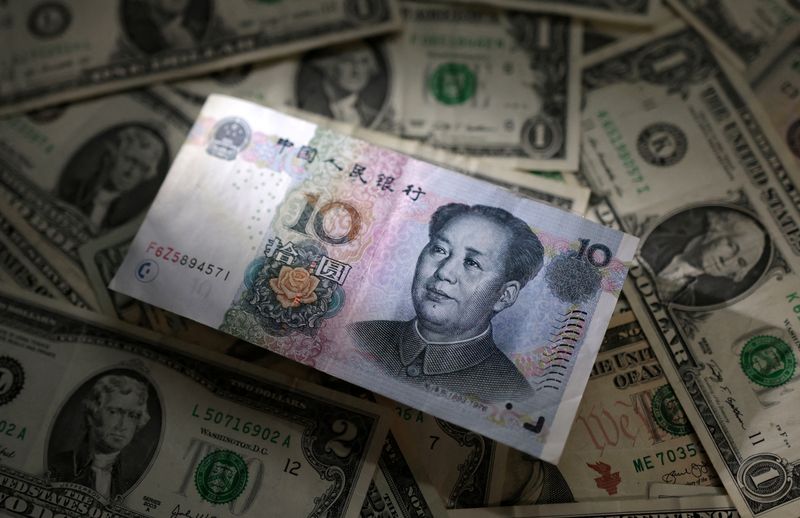 © Reuters. FILE PHOTO: Chinese Yuan and U.S. dollar banknotes are seen in this illustration taken March 10, 2023. REUTERS/Dado Ruvic/Illustration/File Photo
© Reuters. FILE PHOTO: Chinese Yuan and U.S. dollar banknotes are seen in this illustration taken March 10, 2023. REUTERS/Dado Ruvic/Illustration/File Photo
By Upasana Singh
(Reuters) - Investors maintained bearish bets on most emerging Asian currencies as an escalation of the Middle East conflict and prospects of higher-for-longer U.S. interest rates pushed them towards safe-haven assets, a Reuters poll found on Thursday.
Short positions on the Indian rupee firmed to their highest since November 2022, while those on the Singapore dollar touched their highest since October 2022. Bearish bets on Indonesia's rupiah were at a 10-month high, according to a fortnightly poll of 11 respondents.
Surging oil prices due to the escalating tensions in the Middle East, where hundreds of Palestinians were killed in a blast at a Gaza City hospital on Tuesday, have sparked concerns for financial markets.
Net oil importing countries such as India, Indonesia and Thailand face additional inflationary pressures from high oil prices.
Given that the market could remain concerned about the conflict and the possibility of higher-for-longer U.S. rates, "I would expect Asia FX to be somewhat weaker for longer or continue to move around the current levels," said Poon Panichpibool, a markets strategist at Krung Thai Bank.
A recovery in Asian currencies would need a growth story, yields and the U.S. dollar to turn around but "these are not forthcoming at the moment," Christopher Wong, a currency strategist at OCBC said.
Recent comments by U.S. Federal Reserve officials suggested a slight dovish shift in the central bank's policy outlook which provided some relief to Asian assets as the dollar dipped and Treasury yields eased.
The fortnightly poll was conducted before the stronger-than-expected U.S. inflation figures which drove the case for the Fed to keep rates elevated.
The more dovish tones of Federal Reserve speakers - that pointed to the rise in long-end term yields doing some of the Fed's work and lessening the need for further hikes - look less convincing in the face of resilient data, ING analysts said in a note.
Investors cut their short positions on the Chinese yuan and the Malaysian ringgit, the poll showed. Bearish bets on the Thai baht eased from a three-month high.
The Thai baht could get some support in the near term on safe-haven buying such as gold. A rise in gold prices usually leads to profit-taking flows and supports the baht, Krung Thai Bank's Panichpibool said.
Meanwhile, markets remain concerned over China's property sector even as data on Wednesday showed the country's economy grew at a faster-than-expected clip in the third quarter.
The yuan has weakened over 5% so far this year.
The Asian currency positioning poll is focused on what analysts and fund managers believe are the current market positions in nine Asian emerging market currencies: the Chinese yuan, South Korean won, Singapore dollar, Indonesian rupiah, Taiwan dollar, Indian rupee, Philippine peso, Malaysian ringgit and the Thai baht.
The poll uses estimates of net long or short positions on a scale of minus 3 to plus 3. A score of plus 3 indicates the market is significantly long on U.S. dollars.
The figures include positions held through non-deliverable forwards (NDFs).
The survey findings are provided below (positions in U.S. dollar versus each currency):
DATE USD/ USD USD USD/I USD/TW USD/ USD/ USD/ USD/T
CNY /KR /SG DR D INR MYR PHP HB
W D
19-Oct-23 1.02 1.1 0.8 1.06 1.06 1.21 0.78 0.89 0.67
6 4
5-Oct-23 1.17 1.2 0.8 1.00 1.25 0.92 1.08 0.75 1.03
5 1
21-Sep-23 1.29 0.9 0.6 0.84 0.98 1.00 1.03 0.64 0.83
4 1
7-Sep-23 1.28 1.0 0.3 0.65 0.95 0.79 0.86 0.55 0.57
1 0
24-Aug-23 1.42 0.7 0.3 0.77 1.00 0.84 1.18 0.92 0.50
9 4
10-Aug-23 0.74 0.6 0.2 0.60 1.12 0.62 0.98 0.75 0.49
8 8
27-Jul-23 0.77 0.1 -0. -0.14 1.17 -0.0 1.15 0.14 0.15
9 22 6
13-Jul-23 1.33 0.1 0.6 0.52 1.13 0.10 1.77 0.26 0.73
2 2
29-Jun-23 1.74 0.2 0.5 0.30 0.72 -0.1 1.85 0.29 1.03
9 0 4
15-Jun-23 1.59 -0. 0.1 -0.33 0.68 -0.2 1.64 0.74 0.25
03 7 4

